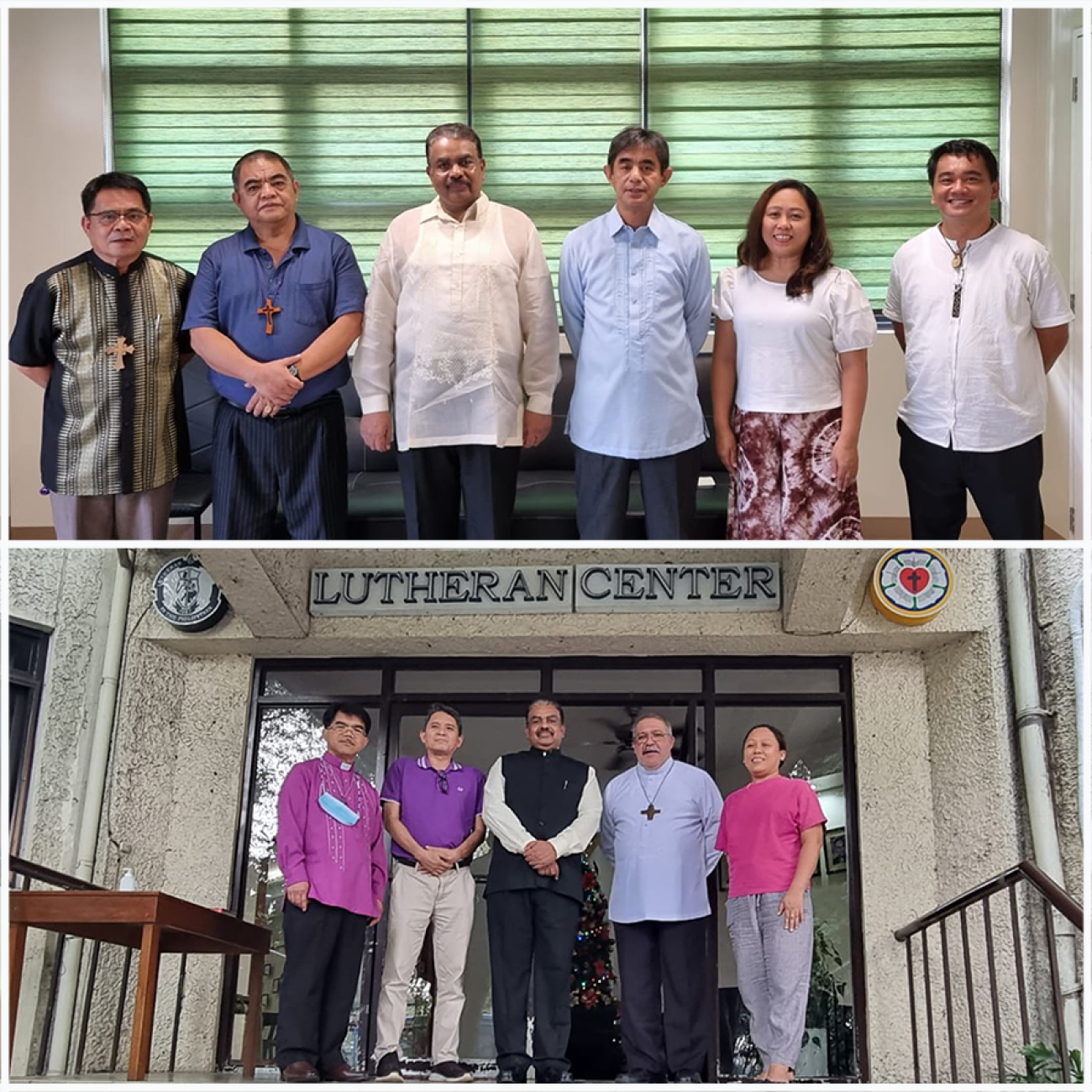CCA General Secretary discusses issues of mutual concerns with church and ecumenical leaders in the Philippines

Photo:1; CCA General Secretary Dr Mathews George Chunakara with the leaders of the Episcopal Church in the Philippines: from left, Bishop Rex R.B Reyes, Most Rev. Henry Brent Alawas, Primate of the ECP, Attorney Floyd Lalwet, Arceli P. Bele (CCA), and Rev. Fr. Ritchie Masegman. Photo:2; With leaders of the Lutheran Church in the Philippines: from left Rev. Antonio del Rio Reyes, (President of the LCP), Rev. Felipe Ehican Jr., (NCCP Chairperson) and Rev. Henry Paul Roa (General Secretary of LCP).
Manila: During a four-day visit to the member churches and the National Council of Churches in the Philippines from 21 to 25 November 2022, the CCA General Secretary held discussions with various church and ecumenical leaders in the country on several crucial issues pertinent to the life and witness of the churches and common concerns on gross and systematic human rights violations prevailing in the country. The CCA General Secretary Dr. Mathews George Chunakara’s discussions with the church leaders also looked at scenarios of the new post-pandemic normal for the church and the ecumenical movement in Asia in the months and years to come. The ongoing trend of “red tagging” of church and ecumenical leaders who are critical of the antipeople polices of the government, the stalled Philippines peace process, increasing militarisation, and extrajudicial killings were also brought to the attention of the CCA General Secretary. The church leaders sought collective advocacy measures at the global level for the Philippines peace process and for the ending of human rights violations. During the first leg of the visit, the CCA General Secretary met with the Officers and senior staff members of the National Council of Churches in the Philippines (NCCP). Accompanied by Church and Ecumenical Relations Coordinator of CCA Arceli P. Bele, the CCA General Secretary visited the headquarters of different member churches based in Manila , and had meetings with the leaders . In response to questions related to the human rights situation and the stalled peace process in the country the church and ecumenical leaders shared the vulnerable situations they continually experience in relation to the ongoing practice of “red tagging”. The concerns they expressed include how church workers involved in the social justice ministries in the country have been subjected to vilification and “red-tagging”. The NCCP has been falsely accused as one of the “front organizations” of local communist terrorist groups. The Philippines churches are concerned about the stalling of the Philippines peace process. The armed conflict between the government forces and the communist insurgency groups that has lasted for over 50 years, remains a seemingly intractable problem till date. Since 2001, the parties have repeatedly tried to negotiate for a peace agreement in which Norway has acted as facilitator at the talks. However, the negotiations have broken down several times. The church leaders expressed their concerns that the conflict situation and the level of trust between the parties in the 53-year-long conflict are currently at an all-time low. The church and ecumenical leaders told the CCA General Secretary about their concern and anguish over the loss of more than 40000 lives during the conflict, in which inequitable distribution of wealth including land reforms, the unjust management of natural resources and a lack of access to the political arena are core issues for contention. Information was also shared about the discussions at the recently concluded United Nations Human Rights Council Universal Periodic Review (UPR) process held in Geneva. Governments from at least 35 countries called on the Philippines to put a stop to extrajudicial killings and exact accountability from the perpetrators, particularly state security forces, while 38 countries called on the Philippines to protect human rights and indigenous defenders, lawyers, judges, environmentalists, and journalists. The CCA General Secretary also shared information on how the churches and national ecumenical councils in different Asian countries are coping in the post Covid-19 situation. Details about the forthcoming 15th General Assembly of CCA, and related regional ecumenical events scheduled for the pre-assembly period, were also shared by Dr. Mathews George Chunakara.Earlier on, Dr. Chunakara had attended the opening of the ‘6th Asian Christian Life-Giving Agricultural Forum’ held on 22 November 2022, at the University of the Philippines, Los Banos, Laguna and delivered a keynote address entitled ‘Sustainability of Food Security is for Safeguarding the Right to Food and Right to Life’.











